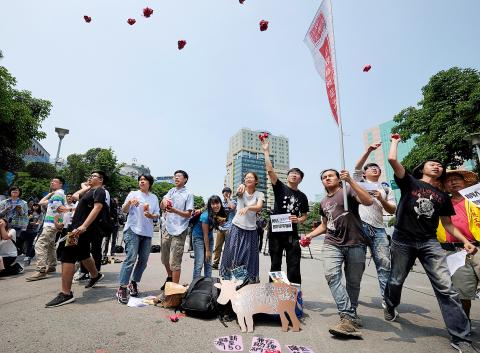A coalition of youth groups yesterday protested outside the Executive Yuan in Taipei, demanding that the government do more to improve salaries.
The Executive Yuan last week unveiled a series of measures to increase wages and attributed the problem of low wages in part to the increasing number of university graduates and migrant workers in recent years.
A dozen students from the Taiwan Higher Education Union, the Alliance Against the Commercialization of Education and other groups “bowed” and “apologized” before the Executive Yuan building, holding instant noodles — which they said were one of the few things they could afford.

Photo: CNA
“The Executive Yuan said the nation’s average monthly salary would have been NT$59,852 if migrant workers’ salaries were not included. That made us realize we have also been lowering the average salary, because we make less than NT$30,000 a month. We are very sorry for that,” said Tamkang University student Hsieh Yi-hung (謝毅弘), an alliance member.
As university students, they are also responsible for increasing the number of university graduates in the nation, which the Executive Yuan said was another cause of low wages, he added.
Although the Executive Yuan is planning to raise the hourly wage to NT$150, employers can still control personnel costs by hiring more full-time employees with a monthly minimum salary of NT$22,000, which has remained unchanged, he said.
“Considering how much consumer prices have increased in recent years, the government should raise the minimum monthly salary to NT$29,189 and the minimum hourly wage to NT$186,” he added.
As part of the plans to increase wages, the Ministry of Education earlier this month said that universities must apply for labor and health insurance for their teaching assistants, but the latter account for only 19 percent of all campus assistants, National Yang-ming University student Chu Chih-te (朱智德) said.
Others, such as research assistants, who might be exposed to greater occupational hazards when working in labs, should also have labor and health insurance, he said.
“Universities can easily avoid having to pay for labor and health insurance by hiring only research assistants and making them do the work of teaching assistants,” he said.
The only way to prevent that is to require schools to provide both types of insurance to all assistants, he said.
If the government really wants to help young people struggling with low wages, it should promise to freeze tuition for three years and increase its education budget by raising the capital gains tax, Shih Hsin University student Lee Jung-yu (李容渝) said.
“Many students have to pay their own tuition and living expenses, and that has made life very tough for them,” she said.
The protest concluded with students throwing paper balls into the Executive Yuan compound and posting a paper that listed their monthly earnings on the compound’s gate — which range from NT$13,000 to NT$30,000 a month.

ANOTHER EMERGES: The CWA yesterday said this year’s fourth storm of the typhoon season had formed in the South China Sea, but was not expected to affect Taiwan Tropical Storm Gaemi has intensified slightly as it heads toward Taiwan, where it is expected to affect the country in the coming days, the Central Weather Administration (CWA) said yesterday. As of 8am yesterday, the 120km-radius storm was 800km southeast of Oluanpi (鵝鑾鼻), Taiwan’s southernmost tip, moving at 9kph northwest, the agency said. A sea warning for Gaemi could be issued tonight at the earliest, it said, adding that the storm is projected to be closest to Taiwan on Wednesday or Thursday. Gaemi’s potential effect on Taiwan remains unclear, as that would depend on its direction, radius and intensity, forecasters said. Former Weather Forecast

As COVID-19 cases in Japan have been increasing for 10 consecutive weeks, people should get vaccinated before visiting the nation, the Centers for Disease Control (CDC) said. The centers reported 773 hospitalizations and 124 deaths related to COVID-19 in Taiwan last week. CDC Epidemic Intelligence Center Director Guo Hung-wei (郭宏偉) on Tuesday said the number of weekly COVID-19 cases reported in Japan has been increasing since mid-May and surpassed 55,000 cases from July 8 to July 14. The average number of COVID-19 patients at Japan’s healthcare facilities that week was also 1.39 times that of the week before and KP.3 is the dominant

The Chinese Communist Party’s (CCP) working group for Taiwan-related policies is likely to be upgraded to a committee-level body, a report commissioned by the Mainland Affairs Council (MAC) said. As Chinese President Xi Jinping (習近平) is increasingly likely to upgrade the CCP’s Central Leading Group for Taiwan Affairs, Taiwanese authorities should prepare by researching Xi and the CCP, the report said. At the third plenary session of the 20th Central Committee of the CCP, which ended on Thursday last week, the party set a target of 2029 for the completion of some tasks, meaning that Xi is likely preparing to

US-CHINA TRADE DISPUTE: Despite Beijing’s offer of preferential treatment, the lure of China has dimmed as Taiwanese and international investors move out Japan and the US have become the favored destinations for Taiwanese graduates as China’s attraction has waned over the years, the Ministry of Labor said. According to the ministry’s latest income and employment advisory published this month, 3,215 Taiwanese university graduates from the class of 2020 went to Japan, surpassing for the first time the 2,881 graduates who went to China. A total of 2,300 graduates from the class of 2021 went to the US, compared with the 2,262 who went to China, the document showed. The trend continued for the class of 2023, of whom 1,460 went to Japan, 1,334 went to